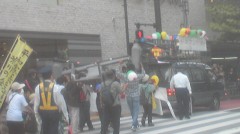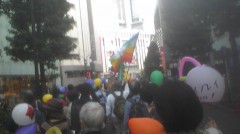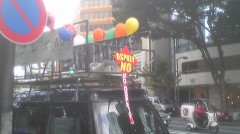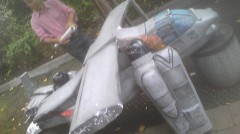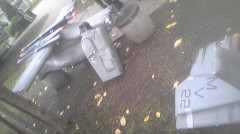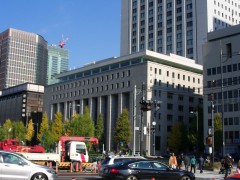31 December 2012
Americans as oppressors to Japanese
18:03 Posted in Japan News, Politics, US-Japan relationship, USA issues | Permalink | Comments (0) | Tags: military, nuclear aircraft carrier, okinawa
08 October 2012
Japan's protest against Osprey (MV-22) deployment
Joined demonstration march in Shibuya, most crowded shopping and entertaining district in Tokyo.
Estimated around 400 people participated. 12 ospreys were deployed in Okinawa, Southernmost island of Japan. Osprey is a hyprid helicoptor that cause strong noize and probability of accident is higher than conventional helicoptors. Propellers work as helicoptor on pad but when it goes high, the mode is changed to airplane that enables it fly further.
But this mode change action can cause severe accident including crashes onto the ground without control.
It is said that US military deployed Ospreys in Okinawa because they were not allowed to maneuver flying in their homeland because of safety problems, that aggrevated Okinawans and Japanese nationals. US-Japan treaty is one between independent sovereign nations.
As other issues such as Nuclear aircraft carrier (CVN 73) in Yokosuka, safety may not be prioritized issue. Highest prioritized issue is why we have to carry burden of US military which does not actually defend us. Threat from China? China is no longer enemy for the U.S. China has become even more important economic ally than Japan for the U.S. Even US influential congressman said military stationed in Okinawa is nothing but ruin of the Cold War.
Recently even after deployment of the new helicoptors, Chinese ships has invaded Japanese sea near Okinawa very frequently. If deterrence works, why do Chinese do that?
We really wonder why US military is stationed in our country.
We should stop treating America as friendly nation although it is not our enemy.
20:53 Posted in Japan News, Politics, Tokyo Life, US-Japan relationship, USA issues | Permalink | Comments (0) | Tags: military, okinawa, nuclear aircraft carrier, osprey
07 December 2011
Book on US Occupation of Japan after WW2 "Washington Heights"
A book "Washington Heights" is written by a female journalist, AKIO Satoko. She studied how the United States government managed occupied Japan after the country defeated his enemy. Then she spotlighted on "Washington Heights," which was exclusive residential area for the U.S. military personnels located in the center of Tokyo. The area was built after the war was over by the order of U.S. occupational force. Before the war, it was Japanese imperial army's property. It was located next to Meiji Jingu Shrine, memorial shrine for the Meiji Emperor (crowned between 1868-1912) .
After the Olympic the place turned to famous public park, Yoyogi Park and Japan's public broadcasting station, NHK building.
The book mainly described episodes of Japan's Occupied era (1945-1952) and economic booming era until Tokyo Olympic in 1964. When the U.S. force arrived in Japan, they occupied many places in Tokyo for its administration purpose. The General Head Quarter was placed in Dai-ichi Life Insurance Building near the Imperial Palace.
But they needed housing for soldiers and staff working for the G.H.Q. So they ordered the Japanese government to build housing block for Americans, requiring facilities and equipment equivalent to American standard of that time. That was the hell of a big job for the Japanese government because the places were all burnt down, and shortage of goods.
The Washington Heights, American style housing provided Japanese new culture and lifestyle. Because American personnels and their family living there wanted entertainment, many Japanese entertainers were recruited for performances for them. That caused a big entertainment icon, Journey's Production, which has released many great talents to Japan's showbiz until now. Morie Hana, a famous Japanese fashion designer opened clothing shop for women living in the residential area. She studied most sophisticated western clothing during that time. As for food culture, Japanese learnt fresh vegetable farming to meet demands from Americans. Japanese learnt how to farm vegetable for the fresh salad taking sanitation into account.
As for how Americans thought about occupying Japan was described as well.
When Americans first arrived in Japan after the war, they were surprised because their former enemy citizens were so friendly to them. Many Japanese in fact, felt liberated when the war was over. So occupation worked more smoothly than expected. The U.S. occupation in fact provided democratization of Japan including women's suffrage, reform of biased wealth distribution towards elite class. The U.S. aim was to demilitalize Japan so they thought cracking down feudal customs and elite class power was best way to do.
The U.S. at that time were so worried about communist threat from Soviet Union. So they treated Japan nicely although Japan was a former enemy.
Most interesting episode noted in the book was that a former Japanese military officer met Afro-American man working as lower rank staff of G.H.Q. who told him that Blacks were glad when Japan attacked Pearl Harbor.
The conclusion of the book was U.S. occupation provided Japan great things but we have to remember Japan has been controlled by U.S. since that time and even after Japan recovered independence, we are always facing indirect occupation by the U.S. such as military bases in Okinawa, Tokyo, and diplomatic pressure to liberalize trade and commerce.
Recently the U.S. hegemony has been on the edge as you see "Lehman Shock" and "Occupy Wall Street" movement. The U.S. can no longer function as a role model for Japanese.
Thanks to the U.S. we could have developed the nation acquiring many great things from them but it is time we develop us ourselves in our own way.
22:01 Posted in Books, Culture, Tokyo Life, US-Japan relationship, USA issues | Permalink | Comments (0) | Tags: history, military
30 April 2011
Dear Tomodachi, Thanks but No Thanks!
Tomodachi means "friend(s)" in Japanese. The U.S. military in Japan is undergoing "Operation Tomodach" after the earthquake of magnitude 9.0, tsunami and nuclear power plant explosion occurred in our country.
Yes, the U.S. has been our greatest and closest friend, especially in a turmoil caused by the earthquake, tsunami and nuclear power plant disaster.
The U.S. government and military helped us a lot by sending air craft carrier, Ronald Reagan to the disastor area coast to transport commodities and equipments in order to rescue refugees in the disaster areas. The U.S. goverment provided expertise and machines to crippled nuclear power plants.
We do appreciate that. But the U.S. is not only country that provides assistance to us. China, Russia, France, Israel and a lot of other nations do so. We do appreciate those nations as well.
I do know for the U.S. Japan is not just a friend, rather very important ally in terms of politics and economics. Japan is 2nd largest owner of U.S. treasury bonds next to China. Japan is one of the biggest trading partner for the U.S.
As for crippled nuclear plants, the U.S. should be very much concerned about this issue because the U.S. is heavily dependent on nuclear power generation having more than 100 plants in the nation. In fact crippled nuclear plants in Fukushima-Daiichi contains U.S. made reactors, designed by General Electronics. The same type of reactors are used in 23 plants in the U.S.
Like the U.S. France is very concerned as CEO of France's biggest nuclear power plant corporation came to Japan to fix the problem. France is much more heavily dependent on nuclear power generation, 80% of its electriciy comes from nuclear power, while 20% in the U.S. and 35% in Japan.
Just recently the U.S. and Japanese government agreed to relocate U.S. Marine in Okinawa. The plan is relocate around 8000 marines to Guam and newly building base inside Okinawa island. That plan has been disapproved by local Okinawans. Even the Okinawa governor demanded the change of plan.
But the both governments seem to go ahead despite the protest movement there because the "Operation Tomodachi" can ease the tension there. But it seems not.
We feel the U.S. is taking advantage of this turmoil to get what they want. In our country such act is called "stealing things from burning house." Later you will be demised.
Don't do that, please if you want to continue to be good friend to us.
Under this plan, Japanese government not only provides the area for the new base but the budget to build the new base. This is huge money.
You know we are now in a big crisis. We need so much money to rebuild the disaster areas and fix and safely abandon nuclear plants. How come you can receive such benefits from troubled nation?
In Yokosuka, USS George Washington evacuated from Yokosuka, home port for the ship right after the earthquake and nuclear power plant explosion happened. Now he returned.
Funny, that ship was deployed for the purpose of defending Japan. This time he did not. Ironically, the nuclear powered ship which contains so much of radioactive materials got away from radioactive.
After he returned, they say the ship is safe. But localies in Yokosuka cannot agree. People have been so concerned about radioactive since its home porting in 2008. Now we've got one from our own.
My advice as your Tomodachi is to rethink the whole package of US-Japan defense treaty and its operation.
We do appreciate great friendship so in order to stregthen such friendship why not just rethink about this issue?
Especially after the earthquake disastor, our nation's financial and mental situation has greatly changed. We do not want to suffer any more.
So be nice TOMODACHI!
13:21 Posted in Japan News, Politics, US-Japan relationship | Permalink | Comments (1) | Tags: okinawa, military, nuclear power, nuclear aircraft carrier, fukushima






